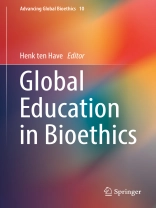This book presents and elaborates on how the teaching of global ethics in healthcare contributes to furthering ideals of cosmopolitanism: solidarity, equality, respect for differences and concern with what human beings, and specifically patients have in common, regardless of where they live and who they are. Global problems such as pandemic diseases, disasters, lack of care and medication, homelessness and displacement call for global responses. The new area of global bioethics is providing answers by arguing that ethical discourse should first of all criticize the structures of violence and injustice that underlie many threats to global health. Education of health professionals should articulate that they are ‘citizens of the world’, like their patients. This book first demonstrates that a moral vision of global education is necessary to gain a global dimension. It is argued that a global framework of ethical principles is available; the challenge is to elaborate and specify that framework into specific educational approaches and models. The book subsequently analyzes goals and challenges of global education in biomedicine and healthcare. It is shown how such challenges (e.g. inequities and cultural differences) can be overcome. Finally, the book presents concrete examples (cases, methods, and practices) of global education in bioethics. The unique feature of the book is that it addresses global education challenges specifically in the area of healthcare, medicine, and medical science. It combines two areas of research and experience that are usually not connected: global bioethics and global education. This book is written for all those involved in global ethics teaching in medicine, nursing, ethics, philosophy, law, and theology courses.
Jadual kandungan
Part I: Moral visions of global education.- Chapter 1. Cosmopolitanism and educating the citizen of the world (Henk ten Have).- Chapter 2. Global bioethics and global education (Solomon Benatar).- Part II: Goals and challenges of global ethics education.- Chapter 3. Goals of global ethics education (Volnei Garrafa and Thiago Rocha da Cunha).- Chapter 4. Priorities in the teaching of ethics in a globalized world (Renzo Pegoraro).- Chapter 5. Can global ethics education solve inequities? (Leonardo de Castro).- Chaper 6. Interculturality and cultural competence (Ayesha Ahmad).- Chapter 7. Resources for global ethics education (Wanda Teays).- Part III: Practices of global ethics education.- Chapter 8. Permanent e-learning in the teaching of ethics (Susana Vidal).- Chapter 9. Arts and humanities as instruments for global ethics education (Jan Helge Solbakk).- Chapter 10. To see differently: incorporating the arts into the bioethics curriculum (Terry Maksymowych).- Chapter 11. The cinema as instrument for teaching and learning global ethics (Flavio Paranhos).- Chapter 12. The role of case studies in global ethics education (Willem Hoffmann).
Mengenai Pengarang
Henk ten Have studied medicine and philosophy at Leiden University, the Netherlands. He received his medical degree in 1976 from Leiden University and his philosophy degree in 1983. He worked as a researcher in the Pathology Laboratory, University of Leiden (1976-1977), as a practising physician in the Municipal Health Services, City of Rotterdam (1978-1979), and as a Professor of Philosophy in the Faculty of Medicine and Faculty of Health Sciences, University of Limburg, Maastricht (1982-1991). From 1991 he was a Professor of Medical Ethics and the Director of the Department of Ethics, Philosophy and History of Medicine in the University Medical Centre Nijmegen, the Netherlands. In September 2003 he joined UNESCO as Director of the Division of Ethics of Science and Technology, working at the Headquarters in Paris, France. Since July 2010 he is Director of the Center for Healthcare Ethics at Duquesne University in Pittsburgh, USA. In 2011 he was appointed as Adjunct Professor at King Saud bin Abdulaziz University for Health Sciences, Riyadh, Saudi Arabia.












